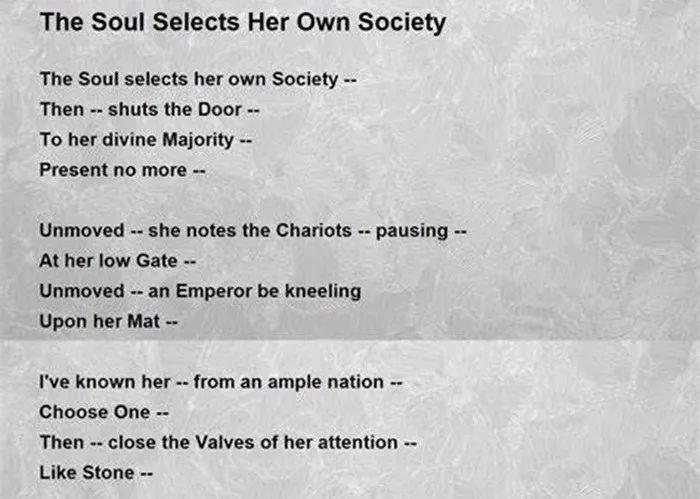Welcome to Poem of the Day – The Soul Selects Her Own Society by Emily Dickinson.
Emily Dickinson, one of America’s most renowned poets, was known for her unconventional style and deep exploration of themes such as death, nature, love, and individualism. “The Soul Selects Her Own Society” is one of her many short yet profound works. In this poem, Dickinson explores the theme of personal choice, isolation, and the importance of self-determination. This article will provide a clear and logical explanation of the poem, helping readers understand its meaning and significance.
The Soul Selects Her Own Society Poem
The Soul selects her own Society –
Then – shuts the Door –
To her divine Majority –
Present no more –
Unmoved – she notes the Chariot’s passing –
At her low Gate –
Unmoved – an Emperor be kneeling
Upon her Mat –
I’ve known her from an ample Nation –
Choose One –
Then – close the Valves of her attention –
Like Stone –
The Soul Selects Her Own Society Explanation
Line-by-Line Explanation
“The Soul selects her own Society –”
The poem opens with the speaker describing how the “soul” (a metaphor for the self or the inner being) chooses its own company. Dickinson suggests that individuals are selective about who they associate with. This line implies that the soul has control over its associations and does not simply accept everyone.
“Then – shuts the Door –”
After making her selection, the soul closes the door, signaling that she is no longer open to others. This action emphasizes the soul’s decision to reject all external influences or attempts at entry once her choice has been made.
“To her divine Majority – Present no more –”
Dickinson refers to the soul’s chosen society as a “divine Majority,” implying that this selection is sacred and exclusive. Once the soul has made her decision, the “majority” of the world, including others who might try to enter, no longer matter. The soul is resolute in its choice and will not entertain others.
“Unmoved – she notes the Chariot’s passing – At her low Gate –”
Here, Dickinson imagines that the soul observes the world’s grand events (“Chariot’s passing”) without being moved by them. The “low Gate” suggests that the soul’s dwelling is humble or simple, reinforcing the idea of personal inner peace and detachment from worldly distractions.
“Unmoved – an Emperor be kneeling Upon her Mat –”
Even the most powerful figures, such as an emperor, are irrelevant to the soul once she has made her choice. The image of the emperor kneeling shows that even the most significant people or worldly power hold no sway over the soul’s decision-making process.
“I’ve known her from an ample Nation – Choose One –”
The speaker, who could be Dickinson herself or an observer, acknowledges that the soul has made a careful and deliberate choice from a wide range (“ample Nation”). This emphasizes the idea of selectivity—the soul’s decision is personal and free from outside pressures.
“Then – close the Valves of her attention – Like Stone –”
The final line metaphorically compares the soul’s decision to close off attention to a stone, symbolizing hardness, immovability, and total detachment. The soul’s focus is unyielding, and once a choice is made, it is firm and resolute.
Theme of Isolation and Self-Determination
At the heart of “The Soul Selects Her Own Society” is the theme of isolation and the power of self-determination. The soul, as depicted by Dickinson, is autonomous and independent. She chooses whom to associate with and, once the choice is made, excludes all others from her inner world. This reflects Dickinson’s own reclusive nature and her belief in the importance of personal integrity and independence. The soul is not swayed by external pressures, whether from powerful figures (like the emperor) or societal expectations.
The Power of Choice
The poem also highlights the power of choice. The soul’s ability to select and reject is portrayed as both an act of freedom and strength. Dickinson implies that making one’s own choices is an act of empowerment. The soul is not passive but actively engages in determining her social interactions and environment.
Symbolism of the Emperor and the Chariot
The imagery of the emperor kneeling and the chariot passing by evokes themes of power, status, and worldly success. However, Dickinson’s soul is unmoved by these symbols of external authority and grandeur. This suggests that the soul’s priorities lie beyond the material or the socially recognized. The emperor and the chariot represent forces that seek attention, but they are of no concern to the soul once she has made her selection.
Interpretation of the Ending
The final lines, in which the soul “closes the Valves of her attention – Like Stone,” suggest a definitive end to any further engagement with the world outside her chosen society. The use of “stone” is significant because it conveys an image of finality, unchanging and cold. The soul is not simply rejecting attention but actively blocking it, maintaining her peace by closing off all distractions.
Conclusion
In “The Soul Selects Her Own Society,” Emily Dickinson presents a powerful meditation on choice, isolation, and self-determination. Through vivid imagery and metaphor, Dickinson explores how an individual can assert control over their life by selectively choosing who or what deserves their attention. The poem resonates with themes of independence and inner strength, encouraging readers to recognize the importance of making intentional, thoughtful decisions in their lives. Dickinson’s portrayal of the soul’s indifference to worldly power reinforces her belief in the sanctity of personal choice and the strength that comes with it.

